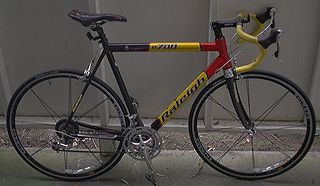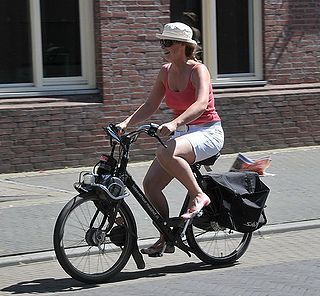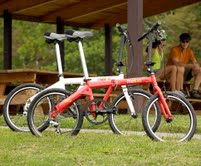
A chainless bicycle is a bicycle that transmits power to the driven wheel through a mechanism other than a metal chain.

A chainless bicycle is a bicycle that transmits power to the driven wheel through a mechanism other than a metal chain.

A bicycle, also called a pedal cycle, bike, push-bike or cycle, is a human-powered or motor-powered assisted, pedal-driven, single-track vehicle, having two wheels attached to a frame, one behind the other. A bicycle rider is called a cyclist, or bicyclist.

The term road bicycle is used to describe bicycles built for traveling at speed on paved roads. Some sources use the term to mean racing bicycle. Other sources specifically exclude racing bicycles from the definition, using the term to mean a bicycle of a similar style but built more for endurance and less the fast bursts of speed desired in a racing bicycle; as such, they usually have more gear combinations and fewer hi-tech racing features. Certain of these bicycles have been referred to as 'sportive' bicycles to distinguish them from racing bicycles.

A tricycle, sometimes abbreviated to trike, is a human-powered three-wheeled vehicle.
Hybrid bicycles blend characteristics from more specialized road bikes, touring bikes and mountain bikes. The resulting "hybrid" is a general-purpose bike that can tolerate a wide range of riding conditions and applications. Their stability, comfort and ease of use make them popular with novice cyclists, casual riders, commuters, and children.

A single-speed bicycle is a type of bicycle with a single gear ratio. These bicycles are without derailleur gears, hub gearing or other methods for varying the gear ratio of the bicycle.

Vehicles that have two wheels and require balancing by the rider date back to the early 19th century. The first means of transport making use of two wheels arranged consecutively, and thus the archetype of the bicycle, was the German draisine dating back to 1817. The term bicycle was coined in France in the 1860s, and the descriptive title "penny farthing", used to describe an "ordinary bicycle", is a 19th-century term.

Bicycle culture can refer to a mainstream culture that supports the use of bicycles or to a subculture. Although "bike culture" is often used to refer to various forms of associated fashion, it is erroneous to call fashion in and of itself a culture.
Orbea is a bicycle manufacturer based in Mallabia, Spain. It is part of the Mondragón Cooperative Corporation and Spain's largest bicycle manufacturer. Orbea manufactures and assembles bikes at their own factory in Mallabia, the other models being made in Portugal and frameset are from China.

A motorized bicycle is a bicycle with an attached motor or engine and transmission used either to power the vehicle unassisted, or to assist with pedalling. Since it sometimes retains both pedals and a discrete connected drive for rider-powered propulsion, the motorized bicycle is in technical terms a true bicycle, albeit a power-assisted one. Typically they are incapable of speeds above 52 km/h (32 mph).
This timeline of motorized bicycle history is a summary of the major events in the development and use of motorized bicycles and tricycles, which are defined as pedal cycles with motor assistance but which can be powered by pedals alone.

A belt-driven bicycle is a chainless bicycle that uses a toothed synchronous belt to transmit power from the pedals to the wheel.

A pedelec or EPAC, is a type of low-powered electric bicycle where the rider's pedalling is assisted by a small electric motor. However, unlike some other types of e-bikes, pedelecs are classified as conventional bicycles in many countries by road authorities rather than as a type of electric moped. Pedelecs include an electronic controller which cuts power to the motor when the rider is not pedalling or when a certain speed – usually 25 km/h (16 mph) or 32 km/h (20 mph) – is reached. Pedelecs are useful for people who ride in hilly areas or in strong headwinds. While a pedelec can be any type of bicycle, a pedelec city bike is very common. A conventional bicycle can be converted to a pedelec with the addition of the necessary parts, e.g., motor, battery, etc.

Jamis Bicycles is an American distributor of bicycles, designed in the US and built in China and Taiwan. Jamis was acquired in 1990 by its parent company, G. Joannou Cycle Co. It is headed by Carine Joannou, chief executive of G. Joannou Cycles since taking over the family business when her father died in 1981.

The following outline is provided as an overview of and topical guide to bicycles:

Bicycle drivetrain systems are used to transmit power on bicycles, tricycles, quadracycles, unicycles, or other human-powered vehicles from the riders to the drive wheels. Most also include some type of a mechanism to convert speed and torque via gear ratios.

Melon Bicycles was a folding bicycle manufacturer based in Chapel Hill, North Carolina. Many cyclists refer to the company as Melon Bikes, Melon Bicycles, or simply Melon. Melon Bicycles went out of business in 2014.
Diamondback Bicycles is a major bicycle brand that is based in Kent, Washington. Diamondbacks are sold in many countries, including the United States, Australia, Canada, and the United Kingdom. Most Diamondbacks are considered to be mid-type bicycles, with a high-end prototype in development as of 2011. Diamondback is owned by global private equity firm Regent, L.P., which also owns Redline Bicycles.

Brooklyn Bicycle Company, is a bicycle company based in Williamsburg, Brooklyn, New York, that was founded by Ryan Zagata in 2011, as Brooklyn Cruiser.

B’TWIN is a trademarked brand of bicycles as well as bicycle parts and accessories marketed by Decathlon.